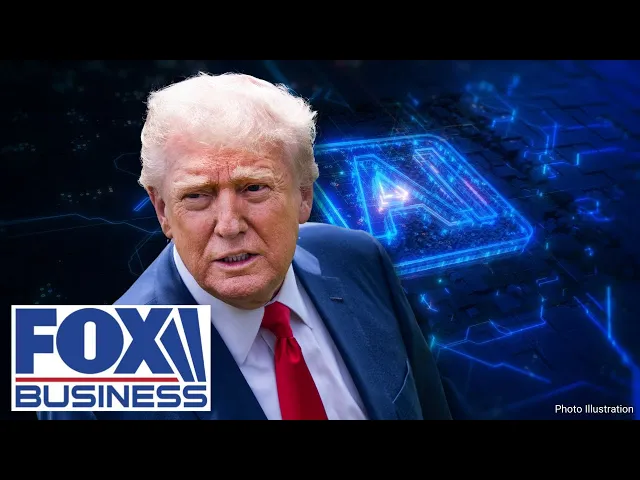Trump praised for tapping into the ‘cultural zeitgeist’ with AI investment

Trump's AI investment taps cultural zeitgeist
In a surprising twist to the 2024 election narrative, former President Donald Trump has positioned himself at the intersection of technology and populism with his recent announcement about artificial intelligence investments. This move, which has caught the attention of both political and tech commentators, signals a potentially savvy strategic pivot as the race intensifies. By embracing AI while simultaneously acknowledging the anxieties it provokes among everyday Americans, Trump appears to be trying to reframe the technological revolution in distinctly political terms.
Key Points
- Trump's approach combines embracing cutting-edge technology investment while simultaneously acknowledging legitimate concerns about AI's impact on jobs and society
- The strategy represents a nuanced position that could appeal to both tech-forward voters and those worried about technological disruption
- This political framing of AI issues demonstrates how technology concerns are increasingly central to mainstream political discourse rather than niche policy discussions
The Political Calculus of Tech Positioning
What makes Trump's AI investment stance particularly notable is how it straddles competing impulses in American society. Rather than simply championing technological progress (a traditionally Democratic position) or rejecting it outright (which might appeal to segments of his base), Trump is attempting to thread the needle by acknowledging the economic anxieties many Americans feel while positioning himself as someone who can harness technological change to American advantage.
This approach reflects a sophisticated understanding of the current moment. Americans across the political spectrum harbor deep concerns about AI's potential to disrupt labor markets, spread misinformation, and accelerate societal change. By acknowledging these fears while simultaneously positioning himself as someone who understands the investment opportunity, Trump is attempting to transcend traditional political boundaries on technology issues.
The strategy also reflects how thoroughly technology concerns have penetrated mainstream political discourse. What might once have been relegated to specialized policy discussions among technologists now resonates deeply with voters worried about their economic future. By framing AI in terms that connect to everyday concerns about jobs and economic security, Trump demonstrates an understanding that technology policy is no longer separate from bread-and-butter political issues.
Beyond the Campaign: The Broader Context
Trump's AI positioning doesn't exist in a vacuum. It comes amid increasing bipartisan concern about America's technological competitiveness, particularly against China. The Biden administration has implemented significant restrictions on technology transfers to China and invested heavily
Recent Videos
How To Earn MONEY With Images (No Bullsh*t)
Smart earnings from your image collection In today's digital economy, passive income streams have become increasingly accessible to creators with various skill sets. A recent YouTube video cuts through the hype to explore legitimate ways photographers, designers, and even casual smartphone users can monetize their image collections. The strategies outlined don't rely on unrealistic promises or complicated schemes—instead, they focus on established marketplaces with proven revenue potential for image creators. Key Points Stock photography platforms like Shutterstock, Adobe Stock, and Getty Images remain viable income sources when you understand their specific requirements and optimize your submissions accordingly. Specialized marketplaces focusing...
Oct 3, 2025New SHAPE SHIFTING AI Robot Is Freaking People Out
Liquid robots will change everything In the quiet labs of Carnegie Mellon University, scientists have created something that feels plucked from science fiction—a magnetic slime robot that can transform between liquid and solid states, slipping through tight spaces before reassembling on the other side. This technology, showcased in a recent YouTube video, represents a significant leap beyond traditional robotics into a realm where machines mimic not just animal movements, but their fundamental physical properties. While the internet might be buzzing with dystopian concerns about "shape-shifting terminators," the reality offers far more promising applications that could revolutionize medicine, rescue operations, and...
Oct 3, 2025How To Do Homeless AI Tiktok Trend (Tiktok Homeless AI Tutorial)
AI homeless trend raises ethical concerns In an era where social media trends evolve faster than we can comprehend them, TikTok's "homeless AI" trend has sparked both creative engagement and serious ethical questions. The trend, which involves using AI to transform ordinary photos into images depicting homelessness, has rapidly gained traction across the platform, with creators eagerly jumping on board to showcase their digital transformations. While the technical process is relatively straightforward, the implications of digitally "becoming homeless" for entertainment deserve careful consideration. The video tutorial provides a step-by-step guide on creating these AI-generated images, explaining how users can transform...
